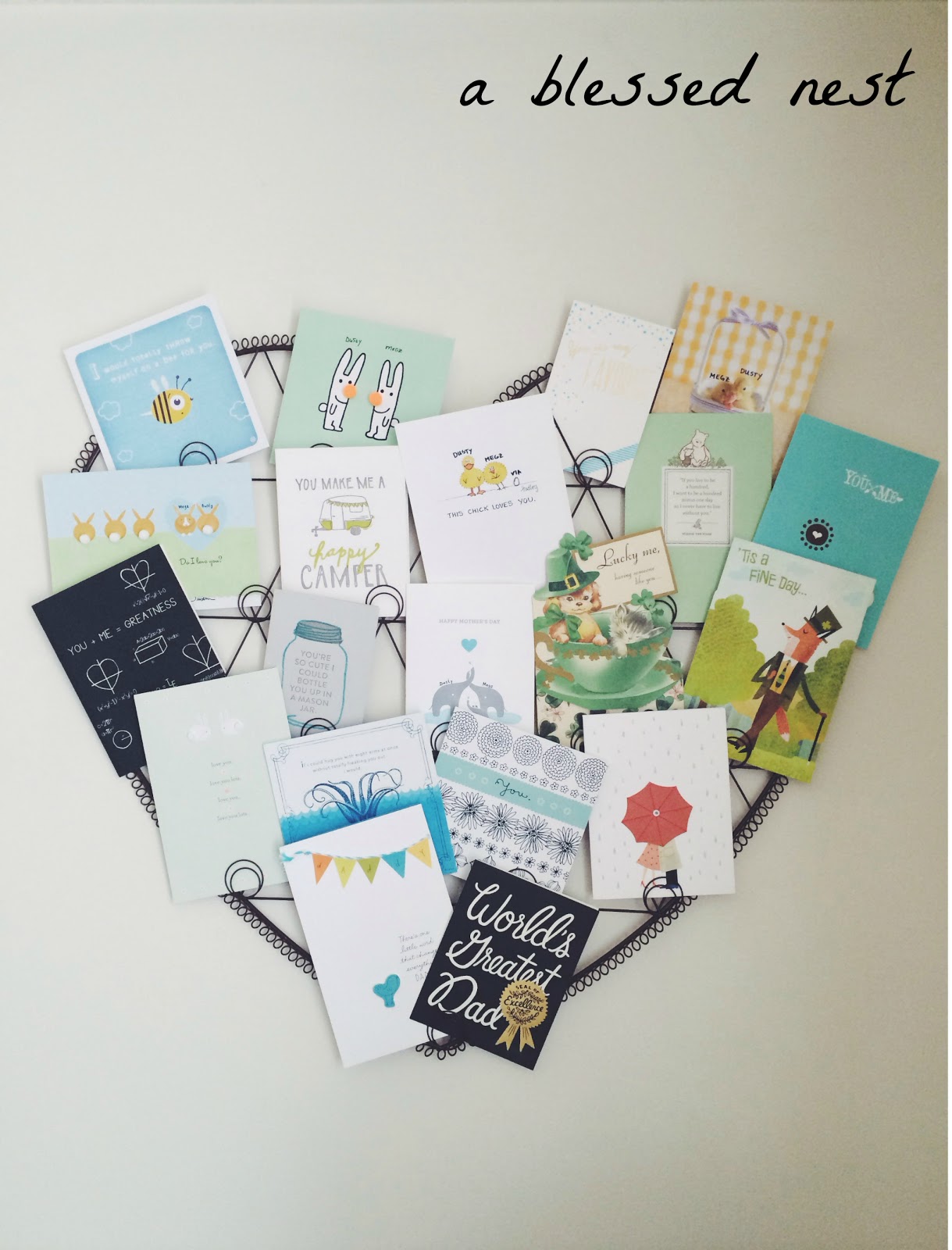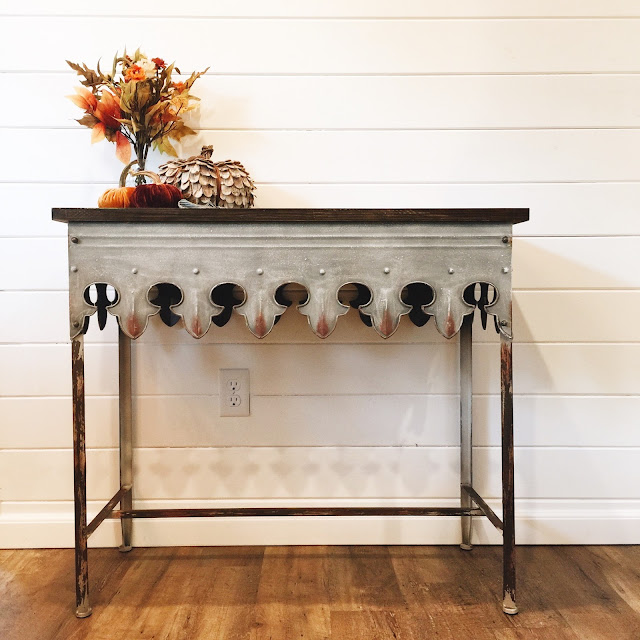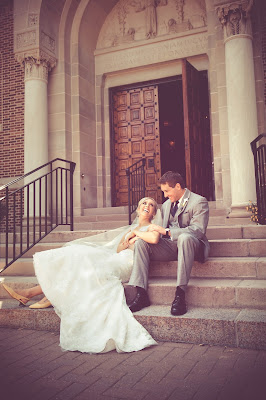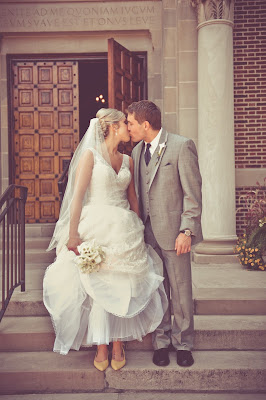
Today is Week 2 of my 4-Week series this month on the 5 Love Languages. Last week I shared a little bit about what the 5 love languages are and why they matter. If you haven't read last week's post, it is available
here. This week I will be discussing 3 of the 5 love languages in greater depth: Words of Affirmation, Quality Time and Receiving Gifts. This series is based on the book "The 5 Love Languages: The Secret to Love that Lasts" by Gary Chapman (available
here).
The first step to discovering your own primary love language and your spouse's love languages is to learn more about what the love languages are, so we will be looking at each of them in depth over the next two weeks. I am sharing them in the same order as the book, but ironically, the three I am sharing today are actually my top 3 as well!
WORDS OF AFFIRMATION //
Expressing love by using words to build your spouse up whether by verbal compliments, words of appreciation, written words in cards or letters, or a short love note
Verbal compliments are powerful communicators of love; sometimes they are expressed in simple, straightforward statements of affirmation, such as "You look beautiful in that dress," or "Thank you for always grocery shopping and cooking delicious meals." Words from your spouse that affirm their feelings toward you or about you significantly impacts the emotional climate of a marriage in a positive way when they are expressed and heard regularly. In fact, when we receive affirming words we are far more likely to be motivated to reciprocate and do something our spouse desires.
Words of Affirmation is one of my top love languages and it always has been. Remember last week when I shared about how I used to write cards to Dustin in hopes that he would love them as much as I do? I never quite got the reaction I was hoping for. I quickly learned that was because cards and words didn't fill him up the way they filled me. Ever since I was young I have loved words -- written and spoken. After Dustin and I got engaged in 2011, he really began to work hard at filling me in this area. He now writes me a card every week, sometimes with a simple message and other times very deep and lengthy expressions. He leaves me love notes around the house for me to find after he has left for work, and he texts me regularly throughout the day thanking me for all my hard work at home with Olivia. The fulfillment my heart gets from his words of love, appreciation, encouragement and gratitude is incredible! I know as a wife & mom, it is easy to feel under appreciated (or unappreciated completely) because we do so much and don't always receive the thanks for it. When Dustin expresses how much he APPRECIATES me for WHO I AM and WHAT I DO for HIM and OLIVIA and OUR FAMILY, I am so fulfilled in my marriage.
Words of Affirmation can also come in the form of ENCOURAGING WORDS.
The word encourage means "to inspire courage." All of us have areas in which we feel insecure. We lack courage and that often hinders us from accomplishing the positive things we would like to do. Perhaps giving your spouse encouraging word will lead them to try something they've been wanting to try but haven't had the courage to do so, or to develop a new talent or potential; they may give your spouse the courage necessary to take that first step. Encouragement requires empathy and seeing the world from your spouse's perspective. We must first learn what is important to our spouse; only then can we give encouragement. With verbal encouragement, we are trying to communicate, "I know. I care. I am with you. How can I help?" We are trying to show that we believe in him or her and his or her abilities. Most of us have more potential than we may ever fully develop and what holds a lot of people back is often a lack of courage.
In my own life, I sometimes have the desire to begin something new and then doubt sinks in because I'm human and I think about what could go wrong. Dustin always finds a way to encourage me, reminding me all that I am capable of and verbalizing his unending support of whatever venture I take on next. To me that shows so much love.
Words of Affirmation can also come in the form of KIND & HUMBLE WORDS.
1 Corinthians 13 reminds us that "love is kind." If we are to communicate love verbally, we must use kind words. This has to do with the WAY we SPEAK, HOW we speak. The manner in which we speak is exceedingly important; the same sentence said in two different tones drastically changes how it is interpreted and received. This is especially true in arguments; instead of using a harsh, loud tone to express how you are feeling, try using a quieter more gentle voice. When you are hearing painful words in a fight, do your best to respond with kind words instead of reciprocating with harsh words, remembering that "a soft answer turns away anger."
Finally, love makes requests -- not demands. If we are to develop an intimate relationship with our spouse, we need to know each other's desires and if we want to love each other, we need to know what the other person wants. The way we express our desires, however, is extremely important. If they come across as demands, we have erased the possibility of intimacy. If instead we make our needs and desires known in the form a humble request, we are giving guidance, not an ultimatum. You can make a humble and kind request and still express love. The husband who says, "Would you mind making that pasta dish I love this week?" is giving his wife guidance on how to love him and thus build intimacy. However, on the other hand if a husband says, "Can't we ever have a decent meal around here?" is making a demand, being immature and his wife is likely to be hurt and possibly fire back. Kind and humble words build your spouse up and still let your spouse know your true thoughts and desires. When you make a request of your spouse, you are affirming his or her worth and abilities. I love when my husband asks me to bake him his favorite dessert or cook his favorite meal or do something for him that I know he enjoys -- it's flattering! It reminds me of how much he loves me and appreciates my talents and strengths.

Other ways to express words of affirmation include giving indirect words of affirmation -- saying positive things about your spouse when he or she isn't around; eventually someone may tell your spouse and you will get full credit for love. Also affirm your spouse in front of others when he or she IS present. Try writing down words of affirmation, like my husband does. Whether it is scribbled on a post-it or written on a beautiful card, it doesn't really matter. It is the words that are important if your spouse's love language is words of affirmation. Written words have the benefit of being read over and over again. In fact, we have a spot in our home where I display all the special cards Dustin and I have given to each other (though most of them are from him to me!) and as I'm putting the cards up and changing them each season, I sit and reread them all. I have a smile on my face all day long because of all the kind things I am reading that my husband wrote for me.
QUALITY TIME //
Expressing love by giving your spouse your undivided attention
When you sit with your spouse and give them 20 minutes of your undivided attention, you are giving them 20 minutes of your life, 20 minutes you will never get back. This is a powerful communicator of love. Quality Time can be spent in countless ways, but a few ideas are: a date night (without the kids!), a walk in the park or even around the block, grabbing a quick half hour lunch during the week together, having a game night together, cooking in the kitchen and having a conversation, taking a vacation as a family, plan a picnic in the spring or summer, sit down and share about your day (without any distractions or technology), having a weekend getaway, etc.
For people whose primary love language is Quality Time, it isn't enough to just be in the same room with someone. A key ingredient in giving your spouse quality time is giving them focused attention, especially in this era of so many distractions. Some husbands and wives think they are spending time together when, in reality, they are only living in close proximity. They are in the same house at the same time, but they are not together. A wife who is texting while her husband tries to talk to her, or a husband who is watching football while his wife is asking him a question, is not giving their spouse their focused attention and quality time.
Remember that quality time does not mean you have to sit and spend all your time together gazing into each other's eyes. It means that you are DOING something TOGETHER and GIVING each other your FULL ATTENTION. The activity is not what matters; what is important is that emotionally you are spending focused time with each other.
In my own life, Dustin and I have both noticed that Olivia's primary love language (yes, kids have love languages too; click here to see the book) is hands down quality time. More than anything, she loves when we just sit with her and give her our focused attention. It doesn't matter what we are playing with or what we are doing, but having our focus on her makes her so happy! Because of this, we both make a conscious effort to give our undivided attention to her when she is awake and save our "to-dos" for when she is napping or asleep.
QUALITY CONVERSATION
Another way to spend quality time together is through having a quality conversation together. By quality conversation, Chapman means, "sympathetic dialogue where two individuals are sharing their experiences, thoughts, feelings and desires in a friendly, uninterrupted context." If your spouse's primary love language is QT, such dialogue is crucial to his or her emotional sense of being loved.
Quality conversation is quite different from the first love language -- words of affirmation -- because words of affirmation focus on what we are saying, whereas quality conversation focuses on what we are hearing -- focusing on listening sympathetically to what your spouse has to say and asking qualities with a genuine desire to understand their thoughts and feelings. Part of this also includes not giving advice when your spouse is sharing something in a conversation; don't try to fix it or create a solution. For me personally, I don't want Dustin to solve my problems or the dilemmas I face, I want him to listen to me and sympathize. I want to feel understood. I'm sure many of you can relate, because a husband's first instinct is often to "fix it" but as women, we want understanding, where our husbands put themselves in our shoes and empathize with what we are going through.
QUALITY ACTIVITIES
Complete this sentence: "I feel most loved by my husband/wife when __________."
One response Chapman received at a marriage seminar was, "I feel most loved by my wife when we do things together, things I like to do and things she likes to do. We talk more. It feels like we are dating again." This is a typical response of someone whose primary love language is quality time. The emphasis is on being together.
Quality activities may include anything in which one or both of you have an interest. The emphasis is not on what you are doing but on why you are doing it. The purpose is to experience something together, to walk away from it feeling, "He cares about me. He was willing to do something with my that I enjoy and he did it with a positive attitude."
That sentence entirely sums up why QT is one of my love languages. When Dustin does something with me that I enjoy -- like browsing in old book stores or tiny gift shops and finding hidden treasures (like that card holder pictured above!), or when he watches a show or movie with me that I have interest in and we sit together enjoying it, I feel so loved. He chooses to spend his time doing something I enjoy and I do the same for him. Sometimes it is an activity that one of us favors more than the other and sometimes it is something we both love. We find a balance and no matter what it is, we tend to enjoy it because we're together.
The activities are limited only by your interest and willingness to try new experiences. The essential ingredients in a quality activity are (1) at least one of you wants to do it, (2) the other is willing to do it, and (3) both of you know why you are doing it -- to express love by being together.
RECEIVING GIFTS //
Expressing love by giving your spouse a gift
The final love language I will share about is another one of mine -- receiving gifts.
Gift giving is a fundamental expression of love that transcends cultural barriers. A gift is something you can hold in your hand and say, "Look, he was thinking of me" or, "She remembered me." The gift itself is a symbol of that thought. It doesn't matter whether it costs money or is handmade. What is important is the thought behind it.
Mothers often remember the days their children bring a flower from the yard as a gift. They feel so loved, even if it is was a flower they didn't want picked. From early years, children are included to give gifts to their parents, which may be another indication that gift giving is fundamental to love.

Gifts are visual symbols and expressions of love. Most wedding ceremonies include the giving and receiving of rings. The rings are outward and visible signs of an inward and spiritual bond. The same is true with gifts -- they are symbols that have an emotional value. Every time I wear something that Dustin has given me (whether clothing or a piece of jewelry), I think of him. All day long as I wear it, I am reminded of how much he loves me. Even looking at my bridal set, every day I see it on my finger, I think of how much he loves me that he would plan and save money to choose, purchase and give me a ring more beautiful than I could ever have asked for. That shows love to me. Whether something fancy or simple, the gift itself isn't as important as the intention and love behind it. A gift can even be as simple as a handwritten note or card. I love the cards Dustin gives me because he fills two love languages in one -- a card is a gift in and of itself to me and it is filled with words of affirmation.
Gifts comes in all sizes, colors and shapes. Some are expensive and others are free. To the individual whose primary love language is receiving gifts, the cost of the gift won't matter. Gifts may be purchased, made, or found. The husband who finds an interesting bird feather while out jogging and brings it home to his wife has found himself an expression of love. He may have been reminded of a special memory they have or a favorite book or verse of hers that has to do with feathers (can you guess my favorite verse?) and in sharing that gift and the meaning behind it with her, she feels loved.
Finally, there is an intangible gift that sometimes speaks more loudly than a gift that can be held in one's hand. Gary Chapman calls it "the gift of self" or "the gift of presence." Being there when your spouse needs you speaks loudly to the one whose primary love language is receiving gifts. The power of presence is often more powerful than any gift that can be bought. Being there when it is extremely important to your spouse -- such as at the birth of a child, at a special event or performance, or at the funeral of a loved one -- that is a gift to them. For me, this means that Dustin takes time off work every once in awhile to just spend the day at home with us as a family. We don't usually take a big annual vacation, so Dustin has the freedom to take time off whenever he wants throughout the year. His job is important to him, but when he takes a day or two off to just be home with me and Olivia, he is giving the gift of presence to us.
Almost everything ever written on the subject of love indicates that at the heart of love is the spirit of giving. All five of the love languages challenge us to give to our spouse, but for some, receiving gifts, visible symbols of love, speak the loudest. When Dustin comes home from work with a bouquet of flowers for no reason at all, my heart sings and melts at the same time; I feel so loved. When he picks me up my favorite snack from the grocery store or when he surprises me with a new book for us to read together, I feel so loved. When he takes something that may be thrown away and turns it into a way to express how he feels about me, I feel so loved. Last Saturday I came home from work and he had taken rose petals (from a bouquet that didn't have much life left) and spread out a message on our bed for me. I felt so loved. That was a gift to me -- so simple but so thoughtful. It takes a little time and some creativity, but if your spouse's primary love language is gifts -- it will be well worth the effort!
Next week I'll be sharing more about the final two love languages -- physical touch and acts of service. I will also explain how to discover your own primary love language -- if you haven't discovered it yet! Happy Wednesday!



